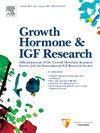IGF1 基因 rs35767 多态性与力量和耐力运动成绩的关系:荟萃分析
IF 1.6
4区 医学
Q4 CELL BIOLOGY
引用次数: 0
摘要
背景:运动成绩是一种多因素表型,取决于多种遗传和非遗传因素的相互作用。有 200 多个多态性与运动成绩相关。位于 IGF1 基因调控区的单核苷酸多态性(SNP)rs35767 会影响 IGF1 基因的表达,并与运动相关表型有关。我们旨在进行一项荟萃分析,以评估 IGF1 基因 rs35767 多态性与力量和耐力运动的运动表现之间的关联:从 PubMed、Web of Science、Scopus、Embase 和 Sport Discus 数据库中检索了截至 2023 年 10 月的文献。本研究根据 PRISMA 声明进行设计。对不同的模型进行了测试,并对异质性进行了评估:本荟萃分析纳入了三项研究。在比较所有运动员和对照组时,发现小等位基因的频率存在统计学意义上的明显差异(p 结论:本荟萃分析支持小等位基因的作用:这项荟萃分析支持 IGF1 基因 rs35767 多态性的小等位基因有利于运动员在耐力和力量运动中的表现。本文章由计算机程序翻译,如有差异,请以英文原文为准。
Association of rs35767 polymorphism in the IGF1 gene with athletic performance in power and endurance sports: A meta-analysis
Background
Sport performance is a multifactorial phenotype dependent on the interaction of multiple genetic and non-genetic factors. More than 200 polymorphisms have been associated with athletic performance. The single nucleotide polymorphism (SNP) rs35767, located in the regulatory region of the IGF1 gene, influences its expression and has been associated with sports-related phenotypes. We aimed to perform a meta-analysis to evaluate the association between the rs35767 polymorphism of the IGF1 gene and athletic performance in power and endurance sports.
Methods
Literature has been retrieved from PubMed, Web of Science, Scopus, Embase, and Sport Discus databases until October 2023. This study was designed according to the PRISMA statement. Different models were tested, and heterogeneity was evaluated.
Results
Three studies were included in this meta-analysis. Statistically significant differences were highlighted for the frequency of the minor allele when comparing all athletes and controls (p < 0.001; OR = 1.74; 95 % CI = 1.26–2.40), endurance athletes and controls (p = 0.016; OR = 1.87; 95 % CI = 1.12–3.1) and power sport athletes and controls (p = 0.007; OR = 1.62; 95 % CI = 1.14–2.31). No statistically significant difference was found between the power and endurance groups. According to data analysis, the recessive model is the most suitable genetic model.
Conclusions
This metanalysis supports the role of the minor allele of the rs35767 polymorphism of the IGF1 gene as favoring an athlete's performance in endurance and power sports.
求助全文
通过发布文献求助,成功后即可免费获取论文全文。
去求助
来源期刊

Growth Hormone & Igf Research
医学-内分泌学与代谢
CiteScore
3.30
自引率
0.00%
发文量
38
审稿时长
57 days
期刊介绍:
Growth Hormone & IGF Research is a forum for research on the regulation of growth and metabolism in humans, animals, tissues and cells. It publishes articles on all aspects of growth-promoting and growth-inhibiting hormones and factors, with particular emphasis on insulin-like growth factors (IGFs) and growth hormone. This reflects the increasing importance of growth hormone and IGFs in clinical medicine and in the treatment of diseases.
 求助内容:
求助内容: 应助结果提醒方式:
应助结果提醒方式:


